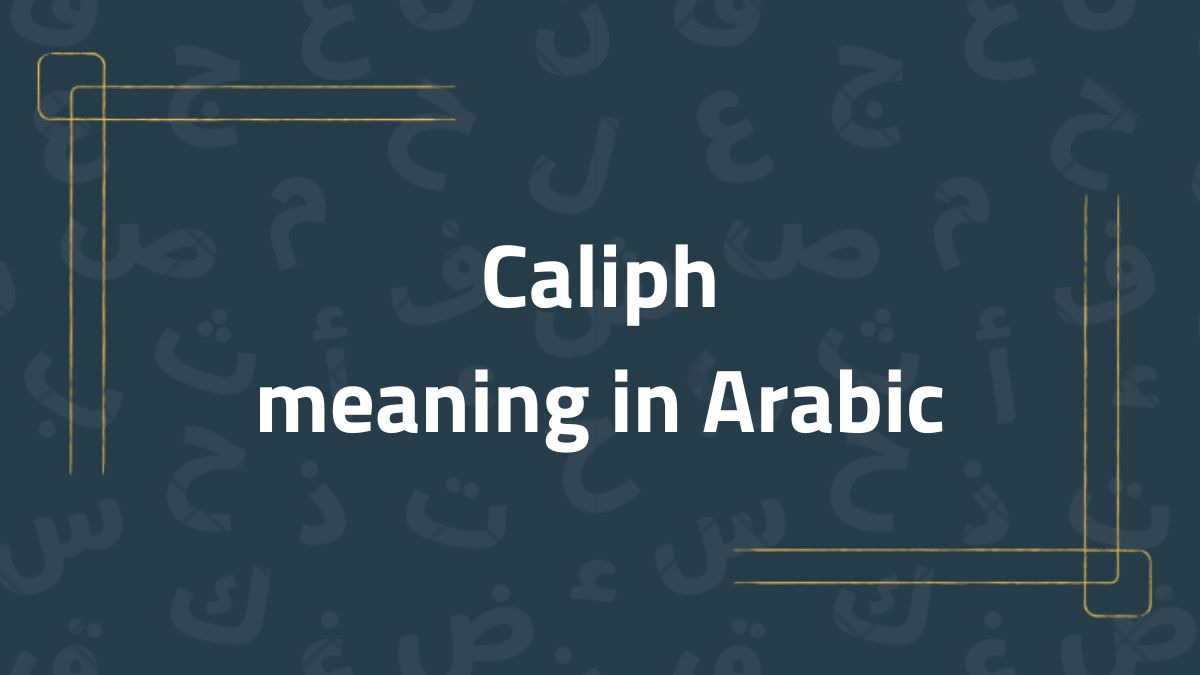The Word "Caliph" Meaning in Arabic With Examples

The word “caliph” holds deep historical and religious significance in Arabic and Islamic culture. It refers to a leader or successor, particularly in the context of Islamic governance. This article explains the meaning of “caliph” in Arabic, its linguistic roots, examples in sentences, and its importance in the Quran and Islamic history.
The Meaning of “Caliph” in Arabic
The Arabic word for “caliph” is خَلِيفَة (pronounced khalīfah). In English, it translates to “successor,” “deputy,” or “steward.” The term is often used to describe the political and religious leader of the Muslim community, known as the Caliph.
Linguistic Root and Grammatical Usage
The word خَلِيفَة (khalīfah) comes from the root خ ل ف (kh-l-f), which means “to succeed” or “to come after.” This root appears in various forms in Arabic, such as:
-
يَخْلُفُ (yakhlufu) – “He succeeds”
-
خَلَفَ (khalafa) – “He succeeded”
-
خِلَافَة (khilāfah) – “Caliphate” (the office or reign of a caliph)
The word خَلِيفَة (khalīfah) is a noun and can take different forms based on grammatical rules, such as خُلَفَاء (khulafā’) in the plural.
Examples of “Caliph” in Arabic Sentences
-
كَانَ أَبُو بَكْرٍ أَوَّلَ خَلِيفَةٍ فِي الإِسْلَامِ.
(Abu Bakr was the first caliph in Islam.) -
يُعْتَبَرُ عُمَرُ بْنُ الْخَطَّابِ مِنْ أَشْهَرِ الْخُلَفَاءِ.
(Umar ibn al-Khattab is considered one of the most famous caliphs.) -
الخِلَافَةُ العُثْمَانِيَّةُ دَامَتْ لِقُرُونٍ.
(The Ottoman Caliphate lasted for centuries.)
Cultural or Quranic Significance of “Caliph”
The term خَلِيفَة (khalīfah) appears in the Quran, where it refers to humanity’s role as stewards of the Earth. In Surah Al-Baqarah (2:30), Allah says:
“وَإِذْ قَالَ رَبُّكَ لِلْمَلَائِكَةِ إِنِّي جَاعِلٌ فِي الْأَرْضِ خَلِيفَةً”
(“And [mention] when your Lord said to the angels, ‘Indeed, I will make upon the earth a successor.'”)
This verse highlights the concept of humans as caretakers of the world. Historically, the title “Caliph” was used for leaders who succeeded Prophet Muhammad (PBUH) in governing the Muslim community.
Common Misunderstandings or Mistakes
Some learners confuse خَلِيفَة (khalīfah) with similar words like:
-
خَالِص (khāliṣ) – meaning “pure”
-
خَلِيج (khalīj) – meaning “gulf”
Another mistake is mispronouncing خَلِيفَة (khalīfah) as “kalifa” without emphasizing the خ (kh) sound.
Why You Should Learn “Caliph”
Understanding the word خَلِيفَة (khalīfah) is important for:
-
Studying Islamic history and governance.
-
Reading the Quran and religious texts.
-
Engaging in discussions about Muslim leadership.
Conclusion
The Arabic word خَلِيفَة (khalīfah) means “successor” or “steward” and carries deep religious and historical significance. It appears in the Quran and refers to both human responsibility and Islamic leadership. Learning this word helps in understanding Islamic culture and texts. Whether studying Arabic or exploring Islamic history, knowing the meaning of “caliph” is valuable.
Discover the Quran and Arabic with Shaykhi Academy
We highly recommend Shaykhi Academy for anyone seeking to learn the Quran and Arabic with excellence. The academy is known for combining expert teaching with a compassionate approach, making it a top choice for students worldwide who want to connect deeply with the words of Allah.
At Shaykhi Academy, you’ll find highly qualified teachers who specialize in guiding learners of all ages and levels. Whether you’re just beginning your journey with Arabic letters or aiming to master Tajweed and Quran recitation, their personalized lessons ensure steady progress at your own pace.
With engaging classes, flexible scheduling, and a focus on both spiritual and linguistic growth, Shaykhi Academy makes learning both enjoyable and impactful.
Watch a sample class below to see Shaykhi Academy in action:
Learn Arabic, Quran, And Tajweed With Free Trial!
Make your home a place of faith, understanding, and connection with the Quran. Whether you're starting from scratch or deepening your knowledge, Shaykhi Academy is here to guide you — step by step. ✅ Tailored for all ages ✅ Clear, structured learning ✅ Flexible online sessions ✅ Book your free trial session now!
Learn More
